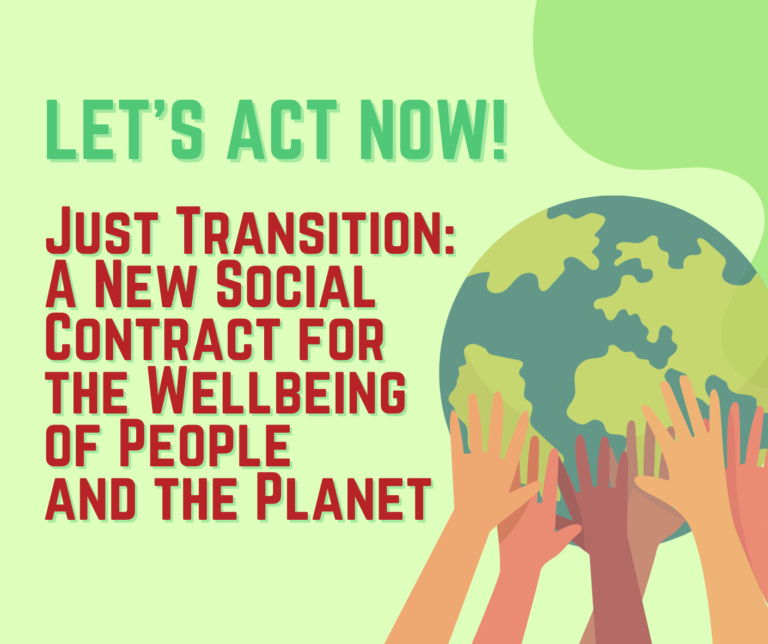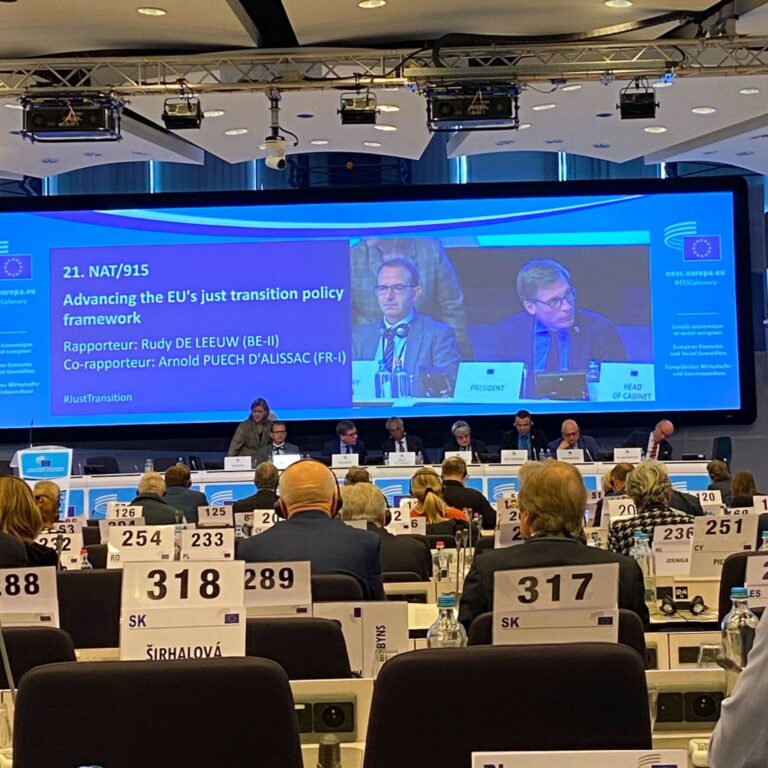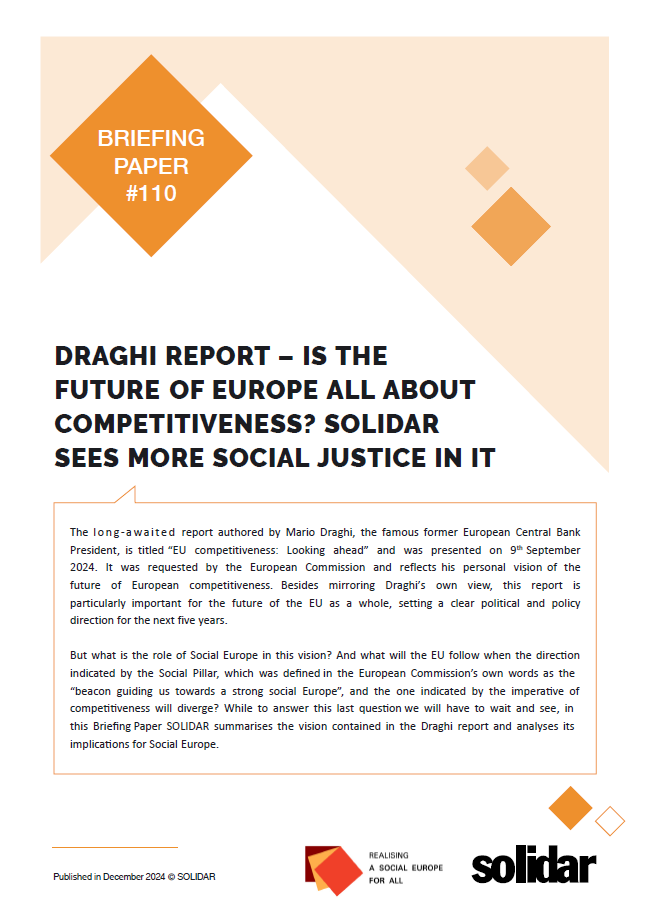A Clean and Social Industrial Deal: For an industrial strategy that advances sustainability and social progress

In 2019, the European Green Deal set Europe’s green transition in motion, charting a course towards climate neutrality by 2050. However, it largely overlooked the socio-economic inequalities and social issues that must be addressed to ensure that the transition fosters truly sustainable and resilient economies and societies. For this reason, SOLIDAR has consistently advocated for a more socially just European Green Deal over the past years.
For its mandate 2024-2029, the European Commission has announced a new flagship strategy to complement the European Green Deal: the Clean Industrial Deal (CID). Designed to promote a sustainable and competitive European economy, the CID will integrate both climate and economic policies. Further details are expected in the European Commission’s forthcoming Communication, to be published on 26 February 2025.
As stated well before the start of the new EU mandate, SOLIDAR strongly believes that social policy must be a cornerstone of the Clean Industrial Deal and therefore advocates for a Clean and Social Industrial Deal that promotes both sustainability and social justice. Industrial progress can never be defined by a deregulatory race to the bottom, and the Clean Industrial Deal should serve as a catalyst for a shift towards a more social and sustainable economic model, rather than reinforcing a ‘business as usual’ approach.
Social policy is the foundation of a competitive industrial policy
People – workers, communities and consumers – are at the core of industrial progress. For Europe’s industries to remain competitive and resilient, our economies must be built on quality jobs with fair wages and decent working conditions, strong social protection, access to high-quality education and other social services, and affordable, accessible, and sustainable energy, housing, and mobility for all. Social policy is not just a complement to industrial policy, it is the foundation.
SOLIDAR urges the European Commission to learn from the European Green Deal’s shortcomings and ensure that the Clean Industrial Deal embeds a strong social dimension from the outset. The CID must maintain its commitment to climate and environmental goals and include social policies that support both workers and non-workers, fostering a more inclusive and equitable society. Moreover, social provisions should be fully integrated into the design, implementation, monitoring and evaluation of industrial policies, in line with the European Pillar of Social Rights and its Action Plan(s).
In strengthening industries and enhancing their competitiveness, the CID must prioritise decent, quality work, protect workers’ rights, prevent the displacement of workers from their communities, promote inclusiveness and remove barriers to facilitate access to the labour market. The CID must include robust active labour market policies that support workers and promote greater participation in the labour market, especially for those left behind. Access to quality training and lifelong learning opportunities and other social services is a cornerstone of just employment policies.
Meaningful and effective social dialogue, collective bargaining and workers’ participation must be at the heart of the CID. Moreover, in order to fully address the rights and needs of all, especially marginalised communities, civil society organisations and local communities must have an active role in decision-making processes that affect where they live and operate, including industrial development plans and investments.
Establishing a robust and well-funded just transition framework
Progress on social policy is inseparable from advancing ambitious climate and environmental policies – they must go hand in hand to ensure a just and sustainable future. The implementation of the European Green Deal and an ambitious 2040 target should therefore be the guiding principle of the EU’s industrial strategy, guiding investments and policies. As Enrico Letta points out in his report, a fair green transition is a catalyst for a stronger European single market.
To make the transition just and fair, the EU must strengthen the just transition framework that was originally established in the European Green Deal, which currently consists of a Council Recommendation, two Commission Recommendations, the Just Transition Mechanism and the forthcoming Social Climate Fund. A robust just transition policy framework should include measures that integrate the environmental and social dimensions from the outset and address them in a complementary and coherent way. Such measures should include a Just Transition Directive to provide a legal framework for the anticipation and management of change in the world of work, as called for by European trade unions.
Investing in industry should not mean handing out blank cheques of public money to companies. It should mean investing in people, with strings attached. Companies and their subcontractors receiving public funds, including from the CID and its foreseen European Competitiveness Fund under the 2028-2034 budget, must be held accountable through clear and ambitious environmental and social conditionalities in public procurement, ensuring a just transition to more sustainable industries. The prioritisation of social and environmental objectives should also be reflected in a fair taxation system, based on the “polluter pays” principle and aimed at redistributing wealth for the benefit of all people and the protection of the planet.
Fair trade policies in the Clean Industrial Deal
European industrial development relies on import and export of raw materials, goods and energy from and to partner countries, making trade policy a key pillar of the CID. The supply of raw materials, goods and energy needed by the European industry must be sustainable and fair towards partner countries and accommodate their industrial policy objectives. While implementing the CID, the EU should actively facilitate the transfer of clean technologies to developing economies to support their own green industrialisation.
The EU should also leverage its trade power to enhance social and environmental standards among its trade partners. To support a just transition, promote sustainability and maintain a level playing field, a range of trade measures will be essential – including targeted assistance to help partner countries adapt and benefit from the transition and higher regulatory standards for imports to ensure compliance with sustainability objectives while avoiding green protectionism.
Conclusions
The EU’s social model is the driving force behind prosperity in Europe. The CID must strengthen the social model to meet new challenges and ensure that no-one is left behind as our economies change. Through the CID, the EU must also continue to develop and implement ambitious policies that drive the green transition, not roll back climate and environmental legislation.
The current short-sighted political narrative around economic competitiveness and deregulation risks jeopardising both our climate goals and the European social model, leading to severe human and social costs while exacerbating the climate crisis. We cannot allow this to happen.





